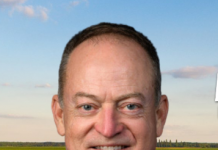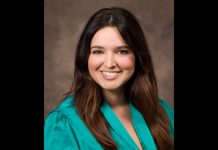BY GEORGE LUMLEY
Four land banked lots, two with zombie houses still standing will be reutilized as community gardens.
Evansville has various forms of land banking. Unfortunately most forms of land banking are detrimental to a thriving neighborhood. Thriving neighborhoods rely on resident land owners and residential housing actually having residents.
Let’s fix that hopes to reutilize 16 zombie properties, (vacant, blighted, and land banked properties) just across Barker Ave. from the Reitz Baseball fields, Norman “Red†Mosby city pool, and children’s playground. Four of these lots, 2813, 2815, 2817, and 2819 Dennison will be reutilized by Charles “Stu†Stuart to create a community garden.
The four lots have been in various states of land banking for as many as fifteen plus years. The house that used to be at 2815 Dennison first went to the tax sale in 2003 and was demolished by the city in 2005. This would indicate that it was probably abandoned by the resident and land banked prior to 2000. The reason for moving a house from a residential property to a land banked one varies. Common causes include simple abandonment, intentions to create a rental, foreclosure, hold for speculation in valuation, bank profit motives, or simply a desire not to part with it, to name a few.
When the city raised the structure at 2815 Dennison in 2005 and added the usual cost ($3,000 to $5,000) to the property taxes, and persuaded the current land bankers, whoever may have had an interest in the property such as the owner, bank lien holder, or tax sale purchaser, to quit paying the property taxes and allow the property to be sold again at a subsequent tax sale. This creates a profit opportunity for the next one in line to continue land banking the property. The property, now a vacant lot, can be purchased (tax and lien free) for as little as $1.00.
You ask why anyone would want to buy a vacant lot and pay taxes on it if they have no use for the lot. Usually it’s a profit motive. You might call it gambling. Often someone decides they want the lot and the owner, with only $1.00 invested, stands to gain substantially. Yes only $1.00 invested because the taxes do not have to be paid. The $1.00 purchase entitles the buyer to ownership for three years without paying anything in addition. Tax assessments and code violation cost will accumulate but are not paid unless the owner finds someone who can repurpose the property from land banking to a beneficial use and makes a sale. The buyer pays the back taxes and nice profit to the owner with the $1.00 investment.
The properties with houses such as 2819 Dennison are land banked much the same way. Tax records show it first went to the tax lien auction in 2006 and was purchased for the taxes owed indicating that it was probably salvageable but in a state of serious decline. The structure was not improved and the tax sale buyer let the property go back to the tax sale process. By this time the properties become unsalvageable. This property sold a couple of times in the tax sales and is currently titled in the name of Vanderburgh County indicating that the commissioners could not even get a minimum bid.
2813 Dennison is the victim of another type of land banker – our lending institutions. The resident in this case was forced out under foreclosure procedures but then the bank did not complete the process to take possession of the property. Often the owner does not even realize that they still have an ownership interest in the house. The bank may even pay the property taxes to keep the property from the tax sale. It appears the banks can make more off the insurance than doing the right thing and offering the property for reutilization to the highest bidder. Without residents these properties soon become zombie houses, too costly to repair, and headed for long term land banking.
Finding a reuse for these zombie properties was a little difficult but getting the properties was easy.  What would we do with four adjoining lots without a resident owner on either side. With a single lot and owner on each side, one of the adjacent owners will want the lot, or they will want to split the lot, or they will want to fight over who gets the lot after the city does the civil duty of hauling off the trash. After Stu stepped up and proposed a community garden I went to the individuals holding a property interest and they were more than happy to sign over their interest to the community garden project.
Stu’s “Howell Community Gardens†is an exciting reutilization for these properties. Stu plans on partnering with the Howell General Baptist Church and other organizations to raise vegetables for a local food pantry.





Good for Studio. Well done.
Great work George! …
Comments are closed.